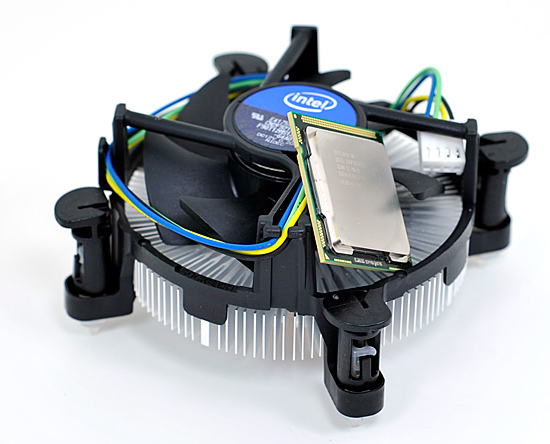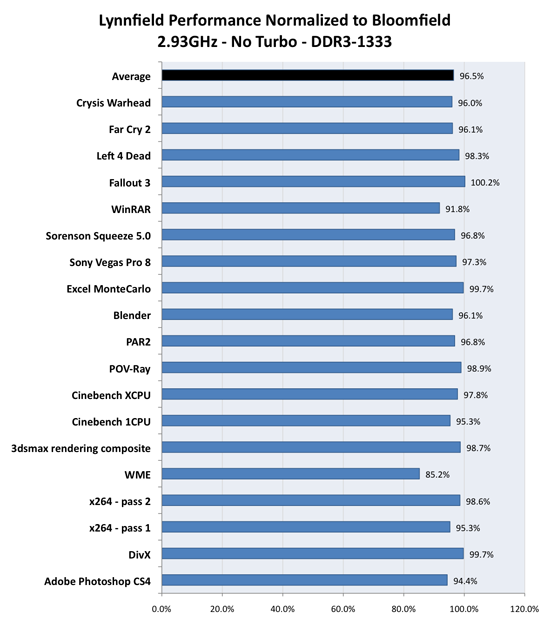The Lynnfield Followup: Turbo Mode and Overclocking Investigated
by Anand Lal Shimpi on September 18, 2009 12:00 AM EST- Posted in
- CPUs
When Lynnfield launched I was on the other side of the country talking GPUs. AMD rented out the USS Hornet to tempt press in and kept them captive for several hours while divulging details of its new DX11 GPUs, the RV770 successors.

Needless to say, while I could read your comments about Lynnfield and what you desired, there was little I could do about it while sitting on (er, in) an aircraft carrier. Gary did a wonderful job with his follow ups but they managed to delay his P55 motherboard reviews. As soon as I landed, it was straight to work on the Lynnfield followup and that's what I'm publishing today.

The first thing many of you asked for were turbo off results between Lynnfield and Bloomfield. On top of that, some wanted results with the exact same memory frequencies. Bloomfield officially only supports up to DDR3-1066, while Lynnfield's memory controller is validated for operation at up to DDR3-1333. Clearly both will work at speeds up to and beyond DDR3-2000, but for stock comparisons I've always tried to stay within validated limits of the platforms.
Below are our application benchmark results comparing Lynnfield to Bloomfield, with turbo disabled, and both platforms running DDR3-1333 at 7-7-7-20 timings. Unlike our standard test beds I've forced the CPUs into their highest performance mode so they are always running at 2.93GHz. The only difference between the two chips is that the Bloomfield is an underclocked Core i7 975 so its un-core runs at 2.66GHz compared to 2.40GHz for the Lynnfield. The real world impact of that difference is negligible:

On average, Lynnfield without turbo mode delivers 96.5% of the performance of Bloomfield. The extra memory controller of Bloomfield is responsible for a 3.5% performance advantage on average; it's just not going to do much at these clock speeds/core configurations.
There are exceptions to the rule. Some applications do benefit from Bloomfield's triple channel memory controller. We see a 15% difference in Windows Media Encoder and nearly a 10% difference in a few other applications. Ultimately it's up to you whether or not the performance difference is worth it, but enable turbo and the advantage clearly goes to Lynnfield as we showed in our initial review.










46 Comments
View All Comments
praeses - Saturday, September 19, 2009 - link
Any chance we can see results from the Phenom IIx4 with the multiplier reduced while using the same platform for comparison?With the significant differences on the PCI-e interconnects for four different platforms I am wondering if latency is giving the advantage in some situations. If a lower clocked PhenomIIx4 still sees similar advantages in the same situations it could be related. Who knows...
JumpingJack - Saturday, September 19, 2009 - link
"Guru3D pointed out an important observation in their Lynnfield review: power consumption goes up considerably when you overclock. It's not just the overclock, but it's the process of increasing core voltage that makes power consumption skyrocket."Dynamic power is P=C*F*V^2 ... it is linear in frequency and goes as the square of voltage. This is why tweaking voltage pushing power up so much more quickly.
Yangorang - Saturday, September 19, 2009 - link
Certainly very interesting GPU-CPU pairing oddities. Well it's not gonna some one sentence explanation if you ever do find out exactly what's going on in there....perhaps even after a few new driver revisions the benchmarks could look completely different...but either way I'm pretty happy with my Phenom II/4850 pairing and I'm completely broke...blyndy - Friday, September 18, 2009 - link
So is there any compelling reason to disable turbo if the power consumption doubles for a 2% performance increase in one or two apps?the zorro - Saturday, September 19, 2009 - link
lynnfield seems to have a roof at 1.4v after that power consumption skyrockets and temperatures reach almost 100C.the zorro - Saturday, September 19, 2009 - link
guru of 3d is showing lynnfield temperatures close to 100C and power consumption of 320 watts when overclocked.http://www.guru3d.com/article/asus-p7p55d-deluxe-m...">http://www.guru3d.com/article/asus-p7p55d-deluxe-m...
Mastakilla - Saturday, September 19, 2009 - link
if I'm not mistaking the Turbo will limit your maximum overclock for all 4 cores...so for example:
* with turbo disabled you can achieve a stable 4,2Ghz overclock. It doesn't matter, if you're using 1, 2, 3 or 4 cores, it will always be 4,2Ghz
* if you enable turbo at 4,2Ghz, it will still work if you use all 4 cores, but once you're using fewer cores, it will Turbo the system to ?4,7Ghz? and of course crash. So to get a stable system, you'll have to lower you're overclock to 3,8Ghz. Then it will run at 3,8Ghz with 4 cores in use and perhaps 4,3Ghz with 1 core in use... So the system will be a bit faster if you're using only 1 core, but a lot slower if you're using all 4 of them
That is also the reason why I would prefer a higher, non-turbo overclock
And that is also what I'm still missing in the Anandtech reviews: test results with higher OCs and better cooling (water) to see if OC is really the advantage of the bloomfield vs lynfield (as Intel claims)
Nich0 - Saturday, September 19, 2009 - link
power consumption doubles?rennya - Saturday, September 19, 2009 - link
Power consumption are not doubled. In fact, there will be no increase in power comsumption at all. If the CPU is rated at 95W, even at the highest turbo mode setting, the consumption will not exceed that.hyvonen - Saturday, September 19, 2009 - link
Wow, you're a bit confused there... If you run at a higher speed (turbo), you consume more power - that's a fact of life.Rating != actual power consumption.
If you really want to do this right, though, look at the total energy needed to complete a task instead of just power. If you run at 50% higher power but complete your task in half the time, it's a net win.